What is up, guys, and welcome back to the channel for another live poker hand. In today's episode, we're going to look into an over 1 million dollar pot, including Tom Dwan playing Pot-Limit Omaha on Hustler Casino Live. Tom is going to pull off one of the most creative lines that I've ever seen in a high-stakes PLO match.
I'm not sure if it's genius or if it's a punt, but as they say, there's a thin line between genius and insanity, and Tom Dwan is certainly right on that edge. You guys decide. Let's jump into the action.
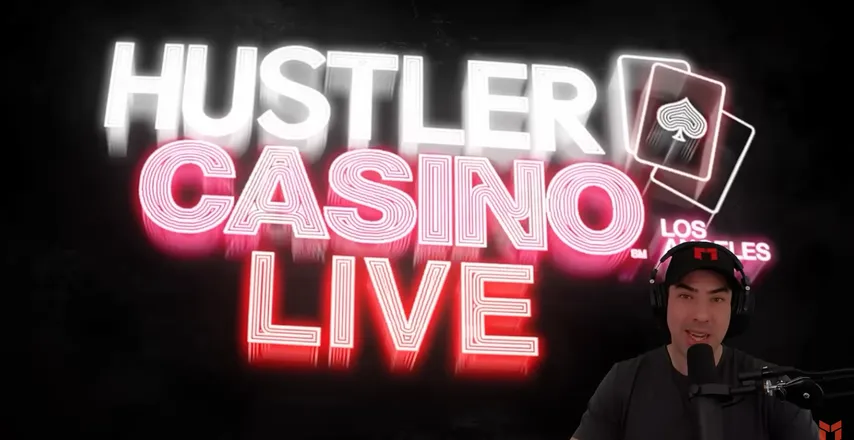
Our hand begins with the professor, who open raises in the hijack position. He makes it two and a half big blinds.
This is a tad too loose; this hand needs to be double-suited or altogether, you want to choose a different hand class.
Now, if you're looking to expand your range, maybe because of image reasons or because you do want to see more flops given your assumed post-flop edge, then the way to do that is to include hands that have more nutted potential. What will happen here very often is you will end up in a multi-way single-raised or three-bet pot, and you want to have a hand that can either apply pressure or perform against pressure well.
The way to do that is by having nutted suits and by having more connectivity, which leads to a stronger connection to the flop.
A prime example here would be with an Ace-high suit, which does better than the with a Jack-high suit to expand your range. Both are not GTO opens, but is losing a lot less at equilibrium than . Other examples could be or even a hand like , where you have a King-high suit and the connectivity.
Oftentimes, people mix those together; and are vastly different because is the most nutted two-card combination, and it's going to perform in multi-way pots a lot better.
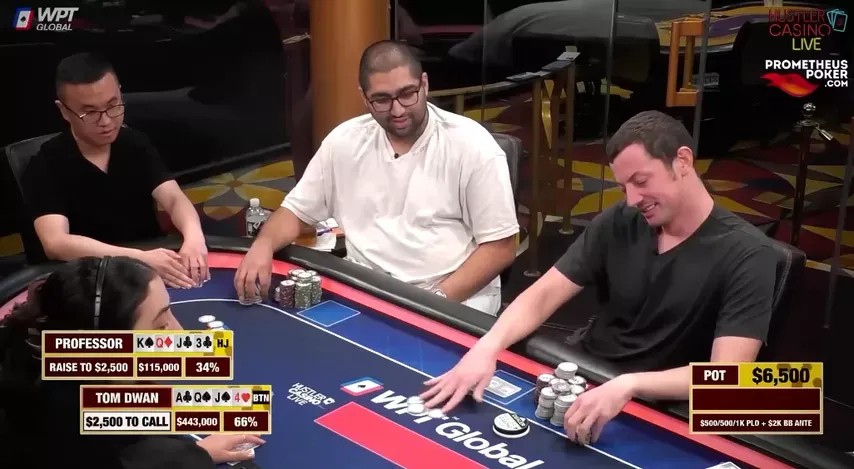
So next up, we have Dwan on the button, and he looks down at with a Queen-high suit. This hand is not stellar; however, there are some things to consider. The raise size is very small, and we have three blinds plus a big blind ante, so there's a much higher incentive to come into the pot, and 22k is a small price to pay to play in position. So this call is fine and also GTO approved.
Then we have Firas in the small blind; he has rainbow. This is an okay call; the hand is connected, you can flop a set, and you can flop a wrap or a straight, so this seems to be fine so far.
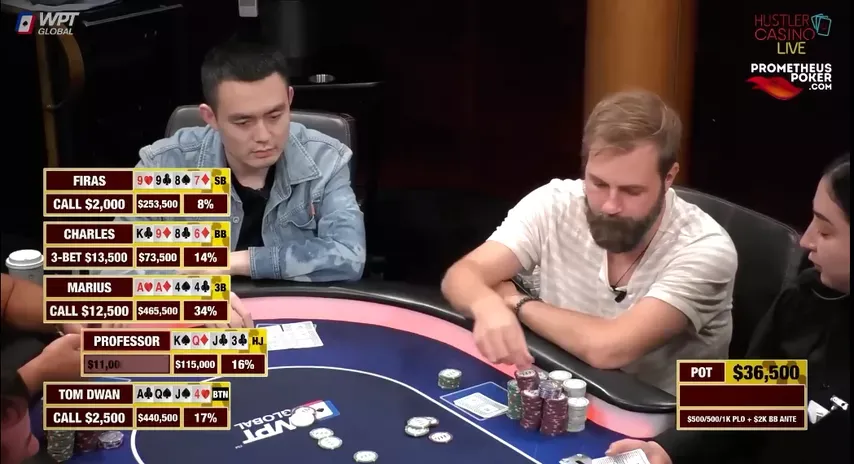
Charles, now in the big blind, looks down at . Very much looks like a hand you do want to consider three-bet squeezing; however, this is actually a hand that wants to fold. If you're looking to three-bet squeeze, you really want to make sure you are very connected so that all four cards play together. In this case, the gap between the King and the nine and the additional gap at the bottom between the eight and the six makes this hand actually a fold. If this would be , where we have a three-connector at the bottom without a gap, then this would make it into the three-betting range.
The hands you generally want to look out for are hands like , where you have very connected hands that are double-suited, but also hands like , , hands that basically have minimal gaps and are double-suited. I would generally be a little bit careful in live games of three-betting too many of those combos, just because you have very little fold equity, and in GTO land, you assume a lot more fold equity, and you're not pushing a pre-flop advantage with those hands.
So next up, you see Marius making a quick cold call of a three-bet holding rainbow. This is an optimal spot to click it back; he can four-bet to a size that allows Charles to reopen the action. So if he is worried that a four-bet gets overcalled by one of the monster stacks like Dwan, you can see here Marius is very deep with Dwan, $440,000 behind. Charles can still reopen the action, which then allows Marius to basically shove pre-flop.
So the optimal line here would be to reopen the action, click it back to Charles, isolate against one player with the best hand, and play these Aces only against one player, pretty much all in pre-flop. But he does decide to call, the professor gets out of the way, and Tom Dwan makes the call on the button.
This makes sense; he's closing the action, he's ultra-deep against Marius, and he also has relative position, which means that Charles, the three-better, is usually going to act first because it will get checked to him from the small blind, and then if he pots, Tom Dwan has position on Marius, who's now sandwiched between Charles and himself. So relative position is also very often quite valuable, especially if you're ultra-deep.
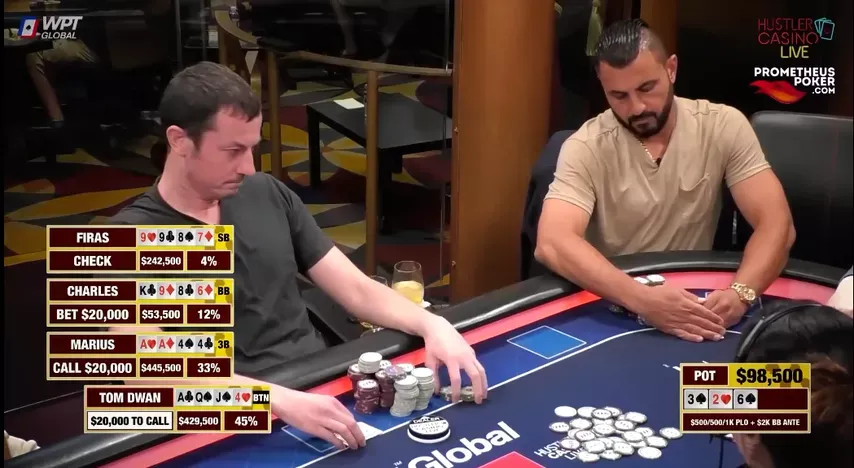
Firas makes the call; it makes total sense, and we're heading to a flop.
We'll do the flop comes down with two and one , and Charles has only top pair. He basically whiffed the flop, and it's time to give up; however, he decides to go ahead and C-bet as a bluff, 20K into three opponents. In PLO, you do require more equity or an enormous amount of blockers in this case to C-bet. I also would advocate for a larger sizing, just pot, which takes maximum advantage of the fact that you are shorter-stacked than the rest of the players.
Looking for a place to practice? These games won't even cost you!
Our freeroll schedule shows thousands of dollars a day that players can compete for – with no entry fee. Run these free MTTs alongside your regular tables and work on your bubble and final table strategy.
- GipsyTeam's unique promotions
- Help with deposits and cashouts
- Access to private freerolls
- Round-the-clock support
- GipsyTeam's unique promotions
- Help with deposits and cashouts
- Access to private freerolls
- Round-the-clock support
- GipsyTeam's unique promotions
- Help with deposits and cashouts
- Access to private freerolls
- Round-the-clock support
- Уникальные акции от GipsyTeam
- Помощь с депозитами и кешаутами
- Доступ в закрытые фрироллы
- Круглосуточная поддержка
- Уникальные акции от GipsyTeam
- Помощь с депозитами и кешаутами
- Доступ в закрытые фрироллы
- Круглосуточная поддержка
- GipsyTeam's unique promotions
- Help with deposits and cashouts
- Access to private freerolls
- Round-the-clock support
- Уникальные акции от GipsyTeam
- Помощь с депозитами и кешаутами
- Доступ в закрытые фрироллы
- Круглосуточная поддержка
- GipsyTeam's unique promotions
- Help with deposits and cashouts
- Access to private freerolls
- Round-the-clock support
- GipsyTeam's unique promotions
- Help with deposits and cashouts
- Access to private freerolls
- Round-the-clock support
- GipsyTeam's unique promotions
- Help with deposits and cashouts
- Access to private freerolls
- Round-the-clock support
- GipsyTeam's unique promotions
- Help with deposits and cashouts
- Access to private freerolls
- Round-the-clock support
- GipsyTeam's unique promotions
- Help with deposits and cashouts
- Access to private freerolls
- Round-the-clock support
- GipsyTeam's unique promotions
- Help with deposits and cashouts
- Access to private freerolls
- Round-the-clock support
- GipsyTeam's unique promotions
- Help with deposits and cashouts
- Access to private freerolls
- Round-the-clock support
- GipsyTeam's unique promotions
- Help with deposits and cashouts
- Access to private freerolls
- Round-the-clock support
- GipsyTeam's unique promotions
- Help with deposits and cashouts
- Access to private freerolls
- Round-the-clock support
- GipsyTeam's unique promotions
- Help with deposits and cashouts
- Access to private freerolls
- Round-the-clock support
- GipsyTeam's unique promotions
- Help with deposits and cashouts
- Access to private freerolls
- Round-the-clock support
- GipsyTeam's unique promotions
- Help with deposits and cashouts
- Access to private freerolls
- Round-the-clock support
- GipsyTeam's unique promotions
- Help with deposits and cashouts
- Access to private freerolls
- Round-the-clock support
- GipsyTeam's unique promotions
- Help with deposits and cashouts
- Access to private freerolls
- Round-the-clock support
- GipsyTeam's unique promotions
- Help with deposits and cashouts
- Access to private freerolls
- Round-the-clock support
- Уникальные акции от GipsyTeam
- Помощь с депозитами и кешаутами
- Доступ в закрытые фрироллы
- Круглосуточная поддержка
- GipsyTeam's unique promotions
- Help with deposits and cashouts
- Access to private freerolls
- Round-the-clock support
- GipsyTeam's unique promotions
- Help with deposits and cashouts
- Access to private freerolls
- Round-the-clock support
- GipsyTeam's unique promotions
- Help with deposits and cashouts
- Access to private freerolls
- Round-the-clock support
- GipsyTeam's unique promotions
- Help with deposits and cashouts
- Access to private freerolls
- Round-the-clock support
- GipsyTeam's unique promotions
- Help with deposits and cashouts
- Access to private freerolls
- Round-the-clock support
- GipsyTeam's unique promotions
- Help with deposits and cashouts
- Access to private freerolls
- Round-the-clock support
- Уникальные акции от GipsyTeam
- Помощь с депозитами и кешаутами
- Доступ в закрытые фрироллы
- Круглосуточная поддержка
- GipsyTeam's unique promotions
- Help with deposits and cashouts
- Access to private freerolls
- Round-the-clock support
- GipsyTeam's unique promotions
- Help with deposits and cashouts
- Access to private freerolls
- Round-the-clock support
- Уникальные акции от GipsyTeam
- Помощь с депозитами и кешаутами
- Доступ в закрытые фрироллы
- Круглосуточная поддержка
- GipsyTeam's unique promotions
- Help with deposits and cashouts
- Access to private freerolls
- Round-the-clock support
- Уникальные акции от GipsyTeam
- Помощь с депозитами и кешаутами
- Доступ в закрытые фрироллы
- Круглосуточная поддержка
- Уникальные акции от GipsyTeam
- Помощь с депозитами и кешаутами
- Доступ в закрытые фрироллы
- Круглосуточная поддержка
- GipsyTeam's unique promotions
- Help with deposits and cashouts
- Access to private freerolls
- Round-the-clock support
- GipsyTeam's unique promotions
- Help with deposits and cashouts
- Access to private freerolls
- Round-the-clock support
- GipsyTeam's unique promotions
- Help with deposits and cashouts
- Access to private freerolls
- Round-the-clock support
- Уникальные акции от GipsyTeam
- Помощь с депозитами и кешаутами
- Доступ в закрытые фрироллы
- Круглосуточная поддержка
- GipsyTeam's unique promotions
- Help with deposits and cashouts
- Access to private freerolls
- Round-the-clock support
- GipsyTeam's unique promotions
- Help with deposits and cashouts
- Access to private freerolls
- Round-the-clock support
- GipsyTeam's unique promotions
- Help with deposits and cashouts
- Access to private freerolls
- Round-the-clock support
- GipsyTeam's unique promotions
- Help with deposits and cashouts
- Access to private freerolls
- Round-the-clock support
- Уникальные акции от GipsyTeam
- Помощь с депозитами и кешаутами
- Доступ в закрытые фрироллы
- Круглосуточная поддержка
- GipsyTeam's unique promotions
- Help with deposits and cashouts
- Access to private freerolls
- Round-the-clock support
- GipsyTeam's unique promotions
- Help with deposits and cashouts
- Access to private freerolls
- Round-the-clock support























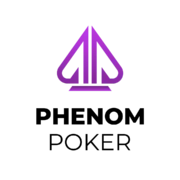
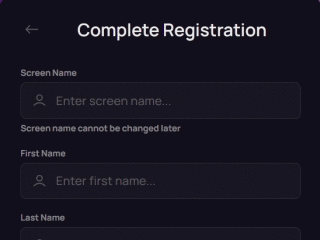
















If you were to pot here, 58,000 into the middle, then Marius in behind has to consider how deep he is with Tom Dwan and Firas behind, and this makes it very awkward and usually makes people under-realize their equity, which basically means that they can't call as many hands as if they would be heads-up or if they were shorter.
So, Charles bets 20K, and Marius is next to act. He has a pair of fours, and he doesn't see a hand out there that beats him, a hand that Charles would be three-betting pre-flop. He is also blocking a by holding .

In my opinion, the best way to play this hand would be to raise now on the flop against this small bet in order to chase out the players behind him. If the players behind him face a 20K bet into a 100K pot, or in the small blind potentially a 120K pot, they will get enormous odds to continue. They would actually be continuing correctly against Marius one pair holding. So, chasing out draws, chasing out over pairs and gutters, or even flush draws on the flop is very valuable for Marius. Also, isolating himself against Charles, who probably has a hand like an over pair and a flush draw, is completely fine in order to play for the pot heads up.
So, Marius is going to make the call, and now Dwan is getting 5-to-1 behind. He is on the button, very deep, and he has a gut shot and a queen high flush draw. It is not the best hand obviously at this point, and he's also not holding another draw. However, there's no way he can fold getting five to one in a spot like that, so he has to see a turn card here in position. Calling the 20K is pretty much the only line that makes sense, and we will see him make the call. Fears will get out of the way. Let's head to a turn.
So, on the turn, the , Charles jams all in for half pot.
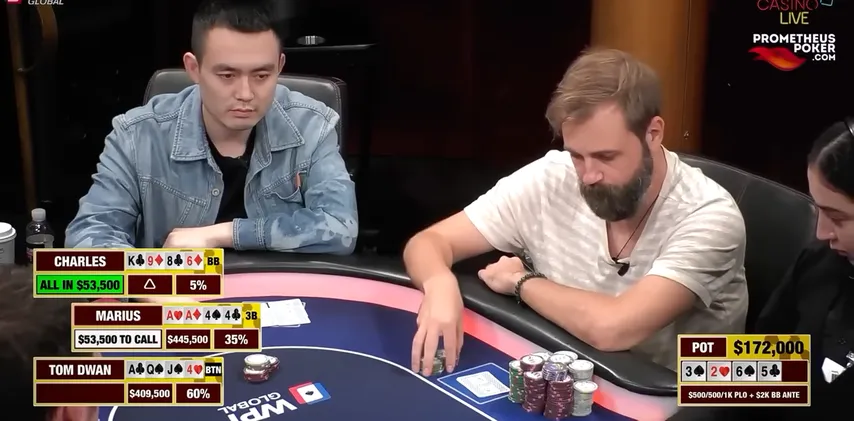
This is not advisable. It's very unlikely both of his opponents are going to fold. They will improve on a very often to a straight, at least two pair, and even if they happen to have an overpair in a flush draw for half pot, they're not going to fold. In any case, they will have Charles's hand pretty much dead.
Now, a more interesting decision point here is Marius, now facing the half-pot size jam. He does have a straight, and he's blocking some of the other straights. Now, realize that if you have two fours in this case, it doesn't mean your opponent cannot have a straight at all. As ranges get more narrow in this case by the flop action, it is much more likely that Tom does have a straight. Once again, there are three straights possible here.
There is a five-high straight, a six-high straight, and a seven-high straight. Having a six high straight is extremely easy. You just need a , , , or , and obviously, is also a possibility.
But I think for half pot, Marius cannot get away from this one. He makes the call, and now Tom Dwan starts having evil plans.
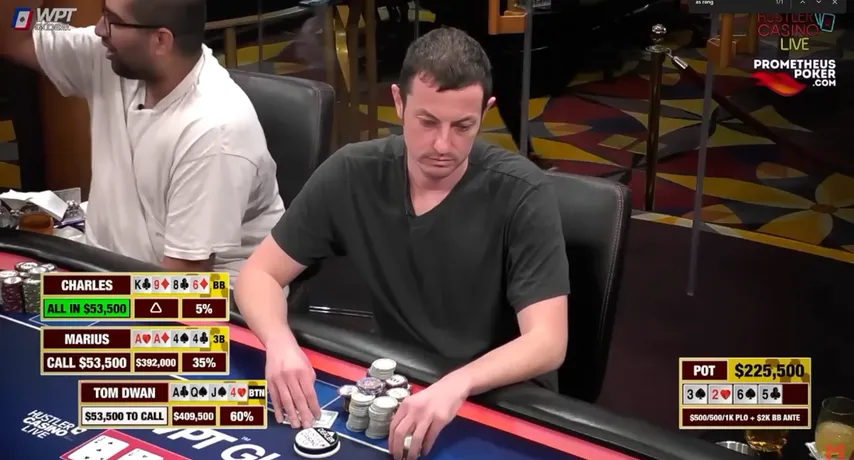
He's considering a couple of things. Marius just calls, so it doesn't look like Marius has a very good straight, like for sure not a because generally would want to isolate and protect against the flush draws or potential sets. Now, Tom Dwan probably puts Marius on either a flush draw, maybe in some sort of combination with a straight draw, or he's going to put him on a six-high straight. A six-high straight here, given the stack sizes in play, is a hand class that is very tough to continue with if you're facing a pot size raise in this three-way scenario on the turn.
So, I think what Tom Dwan is doing here by raising the turn is he's trying to accomplish two things at the same time. On the one side, he wants flush draws to either pay, so hands that are currently behind, and extract value maybe from a hand like pocket kings or pocket queens with a flush draw. He also wouldn't mind getting those hands out of the pot.
At the same time, he also wants to apply maximum pressure to a six-high straight and potentially make that hand fold. So, by raising the turn, he's trying to make better hands fold, maybe get an to fold as well, so the same hand to fold, a better hand to fold, but also extract value from flush draws or potentially deny equity from flush draws.

So, this is a multi-purpose raise on the turn, and it really depends on who you're playing against because if you're trying to move someone off a six high straight here, you need a lot of credibility, and the other player needs to be very familiar with PLO to begin with. So, maybe not a move to try at home, but let's see how this is going to work out for Dwan.
Runout 1: Marius and Tom chop the pot
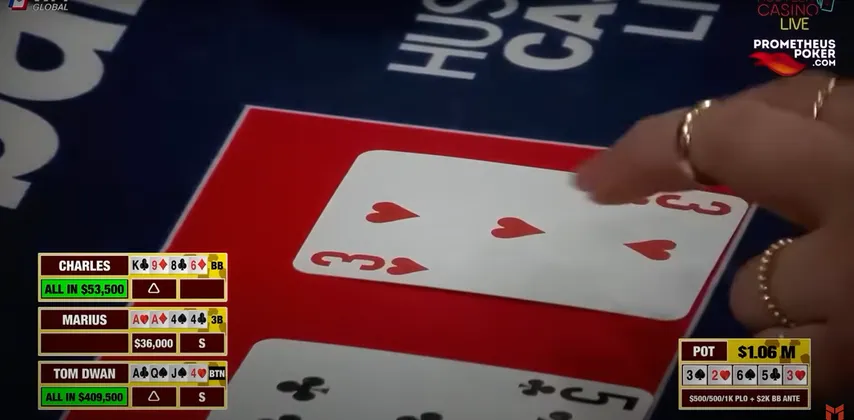
Runout 2: Marius and Tom Dwan chop again.














